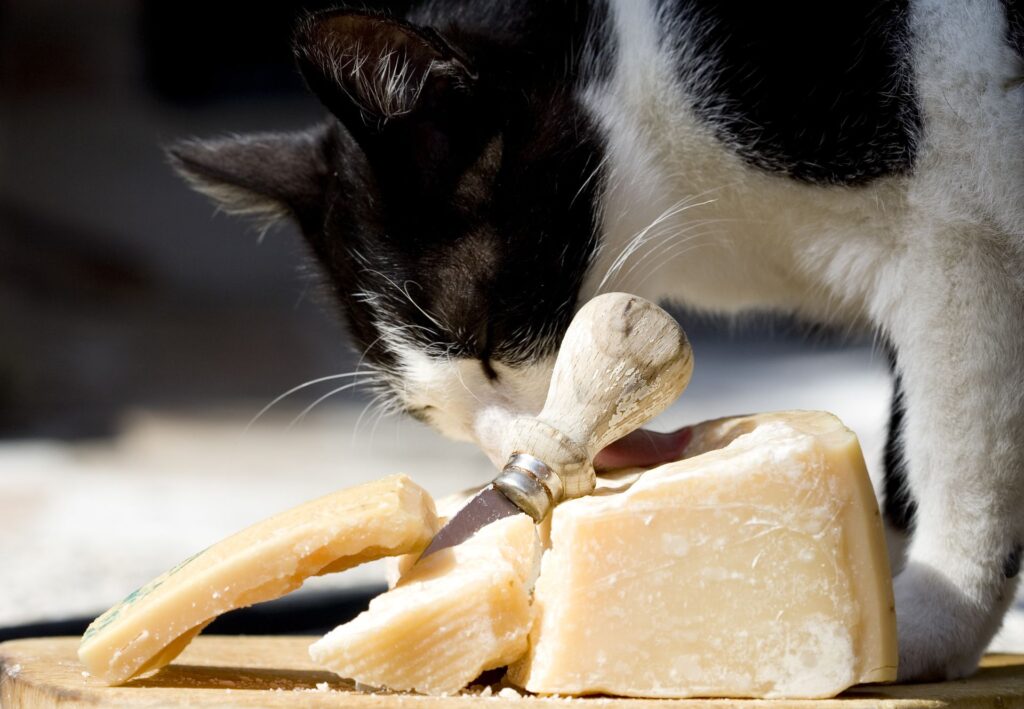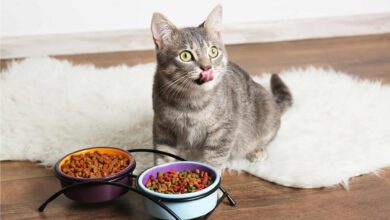
Can cats eat cheese? This is a common question for cat owners considering sharing a bit of their dairy indulgence.
While small amounts of some types of cheese are safe for felines, cheese and other dairy products should only be an occasional treat. Overdoing it on cheese can lead to digestive upset in cats.

Cheese can offer cats some nutritional benefits. But the risks of lactose and high-fat content means cheese should only be fed sparingly and under supervision.
Is Cheese Good or Bad for Cats?
Cheese can potentially offer health benefits for cats in small amounts.
According to the American Kennel Club, cheese can provide protein and calcium for cats, as well as vitamins A, B12, D, and E.
However, the main risk of cheese is lactose. Lactose is a sugar found in dairy products like cheese. Many adult cats are lactose intolerant, meaning too much cheese can cause digestive upset.
The bottom line is cheese is not toxic to cats, but should be considered an occasional treat rather than a dietary staple. Limit cheese to less than 10% of your cat’s daily calories.
What Kinds of Cheese Can Cats Eat?
When picking a cheese for your cat, softer and milder cheeses are best. Soft cheeses like cottage cheese, ricotta, and goat cheese tend to be easier to digest. Aged, harder cheeses like parmesan are higher in lactose.
“Soft and small amount” is the key for picking a feline-friendly cheese, says Dr. Sarah Johnson, veterinary nutritionist. “Avoid anything too aged or hard, which presents more lactose and fat.”
The American Kennel Club recommends short term cheeses like mozzarella, feta, and cottage cheese as best for digestion. Sliced or shredded cheeses are another good option for easy portion control.
How Much Cheese Can Cats Have?
While the occasional cheese treat is fine, it’s best to limit overall quantity. The ASPCA recommends no more than 1 ounce of cheese 2-3 times per week at most for an adult cat.
Anything beyond these risks digestive upset and unhealthy weight gain from the high fat content.
When first introducing cheese, start with tiny portions about the size of your fingertip and monitor your cat’s reaction.
Cheese should make up no more than 10% of your cat’s daily caloric intake. Too much can lead to obesity along with intestinal issues.
Speak to your vet about proper portion sizes depending on your cat’s size and medical needs. Smaller kittens have even greater sensitivity to lactose and milkfat.
Read More: Can Cats Eat Dog Food?
Benefits of Cheese for Cats
In moderation, cheese can provide some nutritional positives for cats. The main benefits are extra protein, calcium, and vitamins.
Cheese is an animal-based protein, making it a high-quality source for cats. Calcium supports bone health, while the vitamins help immune and coat health.
Risks of Cheese for Cats
However, cheese does carry notable risks. The main concern is lactose. Lactose is the sugar found in dairy products, which many adult cats have difficulty digesting.
Consuming too much can lead to diarrhea, gas, vomiting, and other signs of intestinal upset. Fat content is another issue, as the high saturated fat in cheese can quickly lead to obesity.
According to PetMD, milder cheeses like mozzarella contain less lactose, while hard, aged cheeses like parmesan are higher in lactose.
Symptoms of Lactose Intolerance in Cats
If your cat is lactose intolerant, you may see symptoms like:
- Diarrhea
- Gas
- Abdominal pain
- Vomiting
- Reduced appetite
These symptoms typically occur within 12 hours of ingesting dairy like cheese. The severity depends on the amount consumed and your cat’s individual tolerance. Kittens may show greater sensitivity.
Diarrhea or vomiting within a few hours of eating cheese signals your cat may have a lactose issue.
Best Cheeses for Cats
The best cheese choices for cats are softer, milder cheeses. Mozzarella, cottage cheese, feta, goat cheeses, and some softened cream cheeses tend to be gentlest on feline digestive systems.
Look for lower fat versions when possible. Shredded cheeses are a good pick, as the shredding makes fats more digestible.
For maximum lactose tolerance, stick with soft, young cheeses. Prioritize mozzarella and cottage cheese.
Worst Cheeses for Cats
On the other end of the spectrum, harder, aged cheeses and those with more fat are the worst options for cats.
Cheeses like cheddar, parmesan, Swiss, and gouda are all higher in lactose and saturated fat that felines have difficulty processing.
“Avoid any cheese labeled ‘aged,’ ‘sharp,’ or ‘extra sharp’ as those will have too much lactose,” advises Dr. Johnson.
Specifically, limit cheeses like parmesan, Romano, asiago, and other hard Italian cheeses.
How to Give Cheese to Your Cat Safely
When offering your cat cheese, follow these tips to keep the treat safe:
- Start with tiny amounts and increase slowly. The ASPCA suggests starting with a thumbnail-sized piece.
- Pick lower lactose cheeses like mozzarella or cottage cheese. Avoid super hard, aged cheeses.
- Make sure cheese makes up no more than 10% of your cat’s daily calories. Don’t replace their regular diet with cheese.
- Monitor your cat closely. Stop giving cheese if you see signs of diarrhea, upset stomach, or other intestinal issues.
Safety starts with micro portions of lactose-friendly cheeses. Never free feed cheese in place of meals.
What About Cheese for Kittens?
Kittens and cheese are generally not a good mix. Kittens have less mature digestive systems and greater sensitivity to lactose. Their small size also means it’s easier to accidentally overfeed.
Cheese and other dairy should be avoided for kittens under 12 months old. Stick to kitten formula and food.
When to Call the Vet About Cheese
Contact your vet promptly if your cat shows concerning symptoms after eating cheese such as:
- Repeated vomiting or diarrhea
- Lethargy
- Dehydration
- Abdominal pain or bloating
- Reduced appetite for over 24 hours
Severe or ongoing reactions warrant an exam to check for intestinal issues. Inform your vet about any dietary changes like introducing cheese.
At the first sign of vomiting or diarrhea after cheese, give your vet a call.
The Bottom Line on Cats and Cheese
Can cats eat cheese? In very small amounts, yes, cheese can be an occasional feline-friendly treat. However, pet owners should exercise caution.
Limit quantity, pick low-lactose cheeses, and supervise closely. Excess cheese can quickly lead to obesity and intestinal upset in cats.
While the flavor may be tempting for humans, cats are usually happier with treats tailored to their nutritional needs



